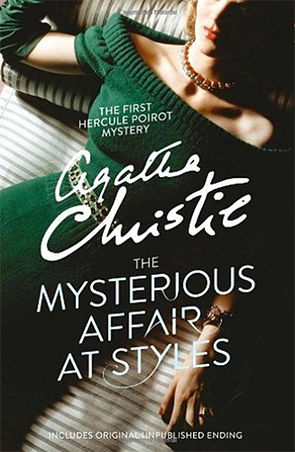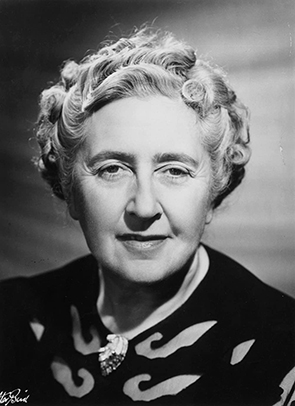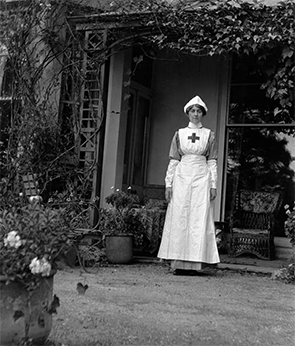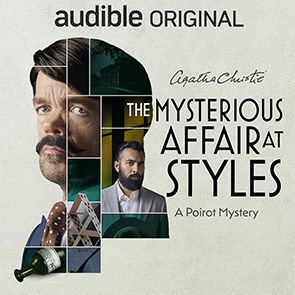The Mysterious Affair at Styles is Agatha Christie’s first mystery, set in 1917 England. Christie started writing it in 1916, but it was not published for four years later, when it was published in serial form in the US in early 1920. It was later published as a novel in the US in October 1920, but it was not published in the UK until the following year. Although her first mystery, The Mysterious Affair at Styles is a typical Christie mystery, set in a country house filled with extended family members, with a complicated poisoning and a twist at the end. Also present is her characteristic use of language. Christie is great at disguising clues by using exact phrasings. You read a sentence and interpret it in your head, but a literal reading may give a different meaning. The book also features two characters who would go on to star in many of later mysteries: Hercule Poirot and Arthur Hastings. Poirot is almost fully formed right from his first appearance:
Poirot was an extraordinary looking little man. He was hardly more than five feet, four inches, but carried himself with great dignity. His head was exactly the shape of an egg, and he always perched it a little to one side. His moustache was very stiff and military. The neatness of his attire was almost incredible. I believe a speck of dust would have caused him more pain than a bullet wound.
The moustache became less stiff and military in later stories but almost everything else is the Poirot we know well. Only one thing struck me as very un-Poirot-like: at one point he considers a dispatch box where the victim kept her most important papers. He does not look at the papers, but observes that he has no authority to look over private papers. The Poirot of later books would have no such scruples and would instantly go through the papers, private or not. Of course, in this case it was important to the plot that he should not go through the papers, but leave it to be rifled through by an unknown before the appropriate people are able to get to it, leaving only a broken lock as evidence of the tampering.
We also establish early on that Poirot is an outsider - a Belgium, evacuated to England. Despite this status, he is welcomed to investigate the murder, first by Hastings who knew him before the War, then later by Detective Inspector Japp of Scotland Yard. Japp had worked with Poirot on several cases before the War and refers back to one case in 1904 where Poirot’s assistance was invaluable to him. Japp’s superior, Superintendent Summerhaye, is less welcoming of Poirot's interference.
Hastings is our narrator in this story. He basically plays Watson to Poirot’s Holmes in many of the Poirot mysteries. He has been fighting at the Front and has been invalided home to England. He accepts an invitation from an old acquaintance to stay at the family’s country estate, Styles Court. The old acquaintance is John Cavendish who plays at being the local Squire at Styles but has no real power or money. Although the property will come to him on his stepmother’s death, his father left both the property and all his money to his new wife for her lifetime. John and his younger brother, Laurence, will not inherit anything until the stepmother dies. The stepmother is Emily Inglethorpe, recently remarried to the much younger Alfred Inglethorpe, seen by everyone but Emily as a fortune hunting bounder (Emily has her own money, in addition to that left to her on trust by her late husband). Also, in the house we also have Mary Cavendish, John’s wife, Cynthia Murdoch, a young protégée of Emily’s and Evelyn Howard, Emily’s companion. To round out the main cast we also have Dr Bauerstein, a London specialist and an expert in poisons, staying in the village for a rest cure. Although he lives in the village, Bauerstein is a close friend of Mary and is frequently in the house.
Hastings has been at Styles for around a fortnight when we get to the main action - the murder of Emily Inglethorpe, poisoned with strychnine. Poirot is called in by Hastings to investigate. It seems obvious to everyone that Alfred Inglethorpe has murdered his wife, but Poirot determines quickly that Inglethorpe has an alibi for a critical time when strychnine was bought from a local chemist. The field then opens up, as everyone in the house has a motive for wishing Emily dead. To complicate things, different forms of strychnine start turning up everywhere, so no one is really sure where the murder weapon came from or how it was administered.
Christie made good use of her own background in creating this story, using the knowledge of poisons she gained while working as a hospital dispenser in the War. The story is peppered with references to official processes for acquiring poisons and the effects of different poisons and their interaction with other drugs. One of the characters, Cynthia, works in the dispensary of the local hospital. She, perhaps, has the least motivation for murdering Emily, but definitely has the best opportunity for acquiring the poison used.
Hastings is good at noticing details, even if he doesn’t get the significance of what he sees. Poirot makes good use of Hastings as observer, even if he doesn’t have a high opinion of Hasting’s brains, as this conversation between the two shows:
‘Yes, he is intelligent. But we must be more intelligent. We must be so intelligent that he does not suspect us of being intelligent at all.’
I acquiesced.
‘There, mon ami, you will be of great assistance to me.’
I was pleased with the compliment. There had been times when I hardly thought that Poirot appreciated me at my true worth.
‘Yes,’ he continued, staring at me thoughtfully, ‘you will be invaluable.’
Poor Hastings just doesn’t get the insult implied in that exchange.
My edition of this book includes the original reveal at the end of the book as bonus content. This ending was rewritten substantially by Christie on the order of her publisher. It was interesting to read the published ending then compare it to Christie's original idea. In its original form, the ending was very Perry Mason like, with a dramatic denunciation of the real criminal by Poirot from the witness stand in the criminal trial of another character. I think the Editor made the right call. The rewritten version makes much more narrative sense. No judge is likely to put up with Poirot’s long-winded explanations and interpretations, and certainly the Prosecutor wouldn’t have sat silently listening to his case being unravelled without objecting to Poirot’s taking control of the courtroom. It just works better with him giving his little talk in a drawing room, just like he was to go on to do again and again in future books.
This is an enjoyable mystery. It’s not one of Christie’s best, but it’s fast paced, entertaining, and with a clever twist at the end. It’s not altogether a fair-play mystery, as Poirot conceals some vital clues from us, but there are enough hints throughout if you read every word Poirot says very carefully.
The Audio Book
As I finished reading a physical copy of this book, I discovered that a new audio version was available. It’s an Audible exclusive, but if you are an Audible member, it’s currently available for free. What really interested me about this new version was that Peter Dinklage was the narrator, as he has such a beautiful voice to listen to. So immediately after I finished reading, I started listening. It was a different experience to reading the book. For a start, this version is actually a dramatised adaption, not a narration. Dinklage is only one of the narrators, playing Poirot, and there is a full cast of well-known actors for the other roles.
As an adaptation, it is much shorter. It comes in at 3 hours 53 minutes, whereas what I would consider the standard length audio for the book is 5 hours 57 minutes (this is the Hugh Fraser narration. Fraser of course plays Hastings to David Suchet’s Poirot in the TV series, and he has narrated many of Christie novels). Much of Christie’s descriptions are cut, leaving us with the dialogue and added background sound effects. A few times where something described in the background is important to the plot, it is moved to a dialogue, such as Poirot commenting on the lack of symmetry in some decorative objects on a shelf, and straightening them, rather than Hastings just observing Poirot’s actions. A few minor characters are also cut from the cast. For example, Poirot interviews only the head gardener to gain information, rather than also getting additional details from an under gardener. This pared down story and cast speeds things up a bit while remaining faithful to the overall story.
There is an emphasis in this version on Hastings’ war experience which is not something Christie did in the book. In the book Hastings occasionally refers to looking forward to a peaceful rest, but this Audible Hastings is unambiguously shellshocked and has frequent flashbacks to the Front. He physically suffers with migraines when stressed, and even panic attacks. He is very obviously traumatised, and although we don’t have details about what he has been through, there are references to what happened, but we understand it was not his fault. It recalled to me Washington's lyrics from ‘History Has Its Eyes on You’ from the Hamilton musical: “I led my men straight into a massacre, I witnessed their deaths firsthand, I made every mistake, I felt the shame rise in me, And even now I lie awake.”
I like this change, as Hastings often comes across as secondary to Poirot. This change broadened Hastings’ character and made him relatable. It also reflects on Christie's own experiences, as her brother Monty was badly wounded while serving in World War I. While he survived, he suffered psychological damage, and he liked to take up his revolver and shoot at people passing the family home in Torquay.
There is a slight change to the ending related to this. Hastings ends the book at the point when he is starting a new job with the War Office in London. However, this audio version ends with Hastings returning to the Front the next day. But he is finally calmer at the thought of returning, having found peace through helping his friends and seeing them happy and freed from suspicion, with the murderer arrested. And there’s a post credit scene with Hastings bravely leading his men as they march on Berlin. So, the ending gives full hope that order has fully been restored.
Poirot’s experience as a refugee is also given more emphasis in this version, including a new scene at the beginning where Poirot is about to board a ship to England. He encounters an official who exploits the refugees for personal gain. He makes a mistake when he attempts this on Poirot. The scene lets us know that while Poirot may be getting old (he has retired from the Belgium Police Force), he still has all his faculties and will not allow himself or his countrymen to be exploited as they flee their country.
It’s a good version for anyone who just wants to get the gist of the story without being bogged down with descriptions. Sometimes the sound effects are a little intrusive (I could have done without the noises of people eating breakfast), but overall I enjoyed the listening experience. But if you want the full story, as written by Christie, choose the Hugh Fraser narration instead.
 RSS Feed
RSS Feed Facebook
Facebook Instagram
Instagram YouTube
YouTube Subscribe to our Newsletter
Subscribe to our Newsletter







No one has commented yet. Be the first!